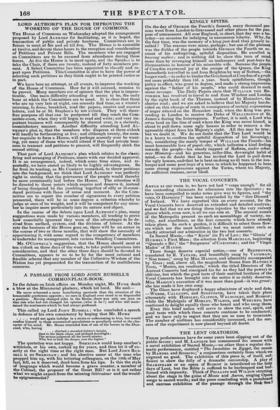LORD ALTHORP'S PLAN FOR IMPROVING THE - WORKING OF THE
HOUSE OF COMMONS:
THE House of Commons on Wednesday adopted the arrangement proposed by Lord ALTHORP for facilitating, as it is hoped, the
transaction of public and private business. Committees are in future to meet at ibn and sit till five. The House is to assemble at twelve, and devote three hours to the reception and consideration of Petitions and Private Bills. The members who are engaged on Committees are to be excused from attendance during those hours. At five the House is to meet again, and the Speaker is to take the Chair, if there are twenty, instead of forty members pre- sent. A Select Committee has been appointed to classify and re- port upon Petitions. This Committee is also to have the power of selecting such petitions as they think ought to be printed entire or in part.
We have here an attempt, at all events, to improve the working of the House of Commons. How far it will succeed, remains to be proved. Many members are of opinion that the plan is imprac- ticable. One main difficulty attending it seems to be, the early hour at which the Committees are to meet. It is clear that those who are up very late at night, can scarcely find time, on a winter's morning, to dress, breakfast, read the papers, receive and answer letters, and be at St. Stephen's by ten o'clock. They will there- fore postpone all that can be postponed till they reach the Com-
mittee-room, when they will begin to read and write; and very im- portant business will consequently be slurred over, in a slovenly, unsatisfactory manner. Another difficulty attending Lord AL- THORP'S plan is, that the members who disperse at three o'clock will hardly be forthcoming at five; and although twenty, the num-
ber requisite to form a House, will perhaps scarcely ever be want- ing, yet many of those who would attend if they had private busi- ness to transact and petitions to present, will frequently shirk the second sitting.
That part of Lord ALTHORP'S plan which relates to the classi- fying and arranging of Petitions, meets with our decided approval.
It is an arrangement, indeed, which some time since, and re- peatedly, we have stated as likely to be highly advantageous. So far from its tending, as Mr. COBBETT remarked, to throw petitions
into the background, we think that Lord ALTHORP was perfectly
right in stating that the grievances of the people would thereby be more prominently laid before the House. The attention will be directed to those points which require and deserve it, instead
of being dissipated by the jumbling together of silly or ill-consi- dered petitions with those of sense and moment. As the Com- mittee are to report the number of signatures to every petition presented, there will be in some degree a criterion whereby to judge at once of its weight, and it will be competent for any mem- ber to inquire more particularly into its nature and object. -In the course of the debate upon Lord ALTHORP'S plan, many suggestions were made by various members, all tending to prove how essentially ignorant they were of the advantages to be de- rived from method, system, and the division of labour. At the rate the business of the House goes on, there will be an arrear in the course of two or three months, that will show the necessity of apportioning it, with some regard to the competency of members to-undertake its management, into various Standing Committees.
Mr. O'CornsELL's suggestion, that the House should meet at ten o'clock on three days of the week, to take public questions into consideration, and that the other three days should be devoted to Committees, appears to us to be by far the most rational and feasible scheme that any member of the Collective Wisdom of the Nation has yet propounded for the transaction of its multifarious concerns.














 Previous page
Previous page